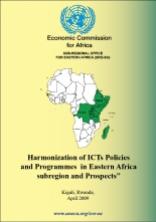Harmonization of ICTs Policies and Programmes in Eastern Africa subregion and Prospects

Developing the sector of Information and Communication Technology (ICT) remains a crucial element in socio-economic development in general and in the process of regional economic integration in particular. In addition, it constitutes a strategic priority for States in the sub-region in the fight against poverty and in promoting education at all levels. As a matter of fact, ICT contributes to economic growth by (1) increasing productivity in all sectors; (2) creating a conducive environment for market expansion beyond national borders and benefiting from economies of scale; (3) reducing costs and facilitating easy access to services, particularly in the fields of administration, education, health and banking; (4) facilitating access to research; (5) developing ICT-related products and services; (6) contributing to better governance, an essential ingredient for growth, through increased participation, accountability and transparency.
Embracing ICT gives broader possibilities of positive externalisation and encourages creativity, learning, and augments people’s aptitudes to resolve problems. However, its influence on employment, on new types of exports and on direct foreign investments depends on a number of factors: “It is the interaction between connectivity, access, security of the network, capacities and competencies, the market structures and the management of enterprises, as well as the regulatory and commercial framework that determine the aptitude of enterprises in a developing country to effectively and efficiently participate in the information economy and to compete in the global electronic markets”.
A number of ICT development initiatives have already been undertaken in Eastern Africa, particularly by the member States, the Regional Economic Communities (IGAD, EAC, COMESA), the African Union (AU), the Economic Commission for Africa (ECA), the International Communications Union (ICU) and the African Telecommunications Union (ATU), etc., in an effort to close the existing digital gap. These inter-state institutions encourage their members to complement the right of regional institutions by a component on “Harmonised Regulation of the ICT Sector”. In this regard, the countries of Eastern Africa have registered steady progress along the path towards economic integration and the development of a common market.
In order to facilitate the harmonisation of their national sectortal policies, the Economic Commission for Africa carried out this Study with a view to examining the legal and regulatory regimens, as well as the national ICT institutional frameworks in each of the 13 member States and to compare the performance of the ICT sector vis-à-vis the best international practices.